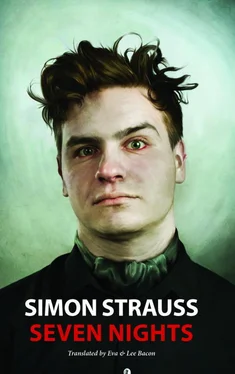There he sits, the happy camper. Of course he’s not sitting on the bench, but on the backrest, his feet on the seat, the toddler on this bouncing knees. “Feet off the seat,” I want to say, but then I remember that the guy is at least fifteen years my senior. For garden gnomes like super daddy, worse punishment is in order. For example, disregard. At some point this will hurt him more than any rude word I might now address to him. At some point he will writhe in despair over the memory of me silently walking past him at the end of this long evening at the races.
On his way home he will raise his pink handkerchief triumphantly into the wind. Next to him, his Swabian girlfriend and the sleeping child in designer clothing. Happily ensconced in their electric car as I miss the train and have to take a cab to the ATM. That’s how it will be. Today.
But soon, I’ll become somebody, and he’ll tell everyone about that night in March when I just walked past him. And he will write to me and beg for a single small word for him, so that he can brag about it to his anorexic children. I will win on all accounts. I will triumph. Not today, not tomorrow. But at some point. I will save my smiling until that day. And continue betting. Every Sunday, come rain or shine…
And when death shows up at my dining room table, unannounced, without notifying my guardian angels, I will say to him: I know the horse to bet on. It’s standing in the back of the paddock. It only lifts its head for those loyal to the king. Stefan George’s verses are written on the hooves: “Past glory bears gifts, albeit late / The spirits inevitably return with full sails / Back to the land of dreams and of legend.”
MOST LIKELY, WE’RE NOT sufficiently possessed by the devil. Most likely, we’re missing what once was the mantra of youth: rage. That and proper stationary. How much was being read—and loved—in the old days. These days we’re constantly running out of time. A visit to an art show has to be prepared weeks in advance with save-the-date emails. Again and again, I tried to read Musil’s The Man without Qualities with three others. We never made it past the first pages. And the Walter Benjamin reading group I stopped after three and a half meetings. There was always something else going on. These things must have been easier back then, in turtlenecks, smoking cigarettes. Or when Theodor Mommsen climbed the library ladder at night, candle in hand. Allegedly his white hair was the first to catch fire, then his forty thousand books. Among them a manuscript that was over a thousand years old. The famous historian had it recklessly sent to his home. The fire consumed everything. Maybe even the fourth volume of his A history of Rome. Or maybe he never wrote it? Even Nietzsche, who despised the Prussian intellectual, was shocked: “Have you read about the fire at Mommsen’s? That all his excerpts are destroyed, potentially the most important preliminary studies made by any living scholar? He is said to have plunged into the flames again and again, until they had to overpower him—already covered in burns—with force.” The next day Mommsen’s students searched the rubble for remnants, collected charred papers and glued them together. They didn’t want to just give up on the last artifacts of universal scholarship.
What kind of a time was that, when the papers were still white and the screens black, when it still meant something to step outside onto the street, into the bars and apartments of strangers? Departure, resistance, slammed doors—I bet nobody asked for sparkling water back then.
What we’re missing most of all today are real spaces. We let ourselves be evicted and fenced into places that were once useful precisely because of their absence of purpose and order. The library where I’m sitting right now, for example, is nothing but a service station.
Instead of bookshelves, I’m greeted by information desks and screens. Everywhere I have the opportunity to extend my membership, get information about dental hygiene or return Club Mate bottles. There’s a repair cafe that revives defective electronics. Sewing machines stand at the ready to mend torn pants, and on the third floor there is a 3-D printer and a recording studio. The Ministry of Health advertises a workshop and there is a poster for a drone flight show.
Downstairs, in the family area, where kids jump around on digital playgrounds and play computer games, there’s a gong that sounds when a new baby is born in the maternity ward of the city’s hospital.
But the books, those stand on the sidelines. They don’t fit into the image of the modern architecture of emptiness. That’s why they’re being relocated and demoted to space holders. The library has turned from a space that treats books like treasures, where thick layers of dust protected knowledge, to a profane location where much happens and little is read. Revolutions don’t always devour their children immediately. Sometimes they just suck them dry. Like a vampire that prefers to consume its victim slowly, rather than a monster that gobbles them down in one bite. The digital forces weaken their victims slowly until—still halfway intact on the outside, but completely devoid of energy on the inside—they collapse. Porn theaters, travel agencies and postcards have already lost their lives this way, and now libraries are in danger. With every Wikipedia page, every Google Book Scan they lose a grain of their aura, an ounce of their necessity. Jobs and funds are being cut.
Even though now would be the time for the library to position itself confidently against the intangible. Its allure comes from the endless rows, the battalions of spines. In the smallest space it offers visitors a cosmos of perspectives: Within it the reactionary has space next to the progressive, the exceptional stands back to back with the conventional. The library is a home to polyphony. In the glow of the green lamp shade you travel more safely than on any slick surfboard. The library as the departures hall. The books as the planes with their gangways extended. Patiently awaiting their sole passenger. At some point he will come, on a dark winter night and pull at random while strolling along the shelves. Then the engine starts and the plane lifts off.
“The library will close in fifteen minutes,” the voice of an unemployed actress informs me. Via the intercom she wishes me a safe journey home. And at the exit they will probably offer hot towels and coconut water.
Where does it come from, this dull, snivelly feeling of having been born too late? To live in times without arias and excess? Time in which you want to plead with your parents: “Keep your memories to yourselves! Don’t you realize how they crush our shoulders and our courage with their weight?”
Whenever I imagine the past, I picture how days started (maybe not quite with a gunshot wound, but at least with a bloody wet shave), the delicious anticipatory rage with which one opened the newspaper, downed the coffee and threw the one-night-stand off the sofa—how one loved loving with all its difficulty. Whenever I think of the past, I get envious. Because so much was destroyed that could be built anew. Nobody wants war, but we should have the freedom to dream of a fresh beginning. A time when adversaries existed, real enemies. When you weren’t permitted to take the coward’s route, to avoid saying hello. “You also have to greet those you don’t know” (Karl Kraus). A time when we actually said things to each other’s faces that left their marks. When real things were the subjects of discussions, not just states of affairs, when the arguments were about right and wrong, and the critical impulse manifested itself, thereby putting itself at stake.
Читать дальше












